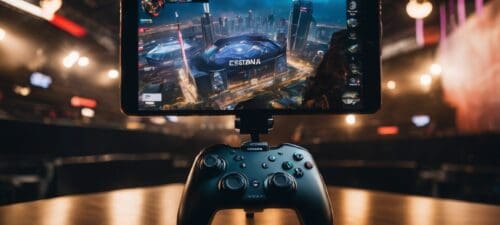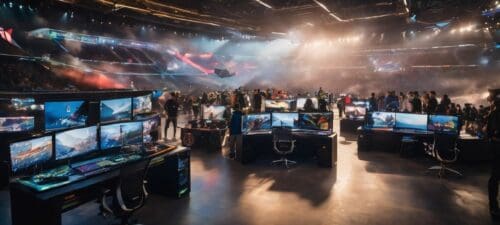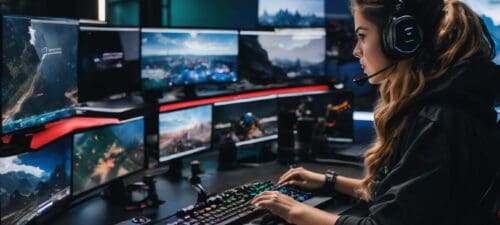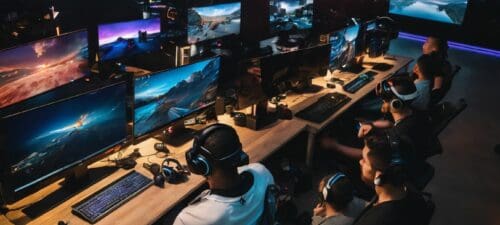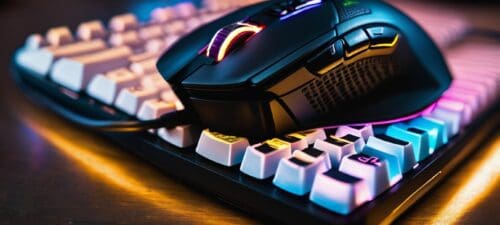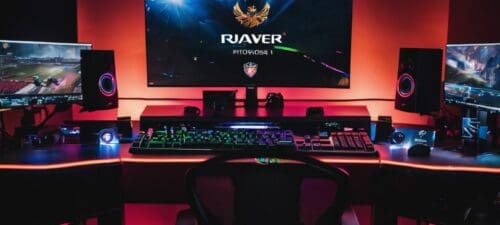Esports and the Development of AI Coaches
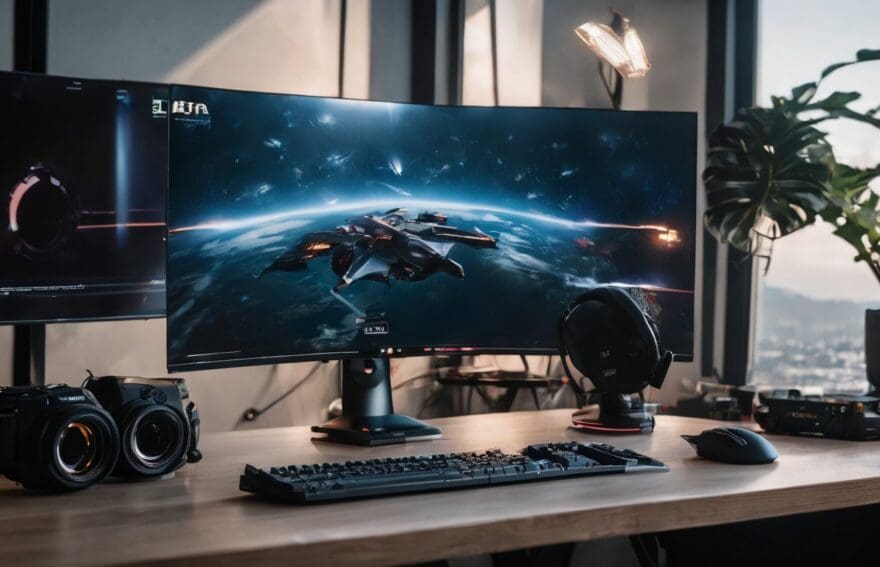
Updated On: February 14, 2024 by Aaron Connolly
Struggling to level up your esports prowess? You’re certainly not alone in facing this challenge; it’s a familiar hurdle many of us encounter. But don’t despair—AI coaching could be the innovative solution you’ve been searching for.
With an AI mentor, players can benefit from continuous feedback, refining tactics and skills that are crucial for triumphing in competitive gaming arenas. Immerse yourself in this exploration to uncover how artificial intelligence might just give you the edge in your quest for esports excellence – ready to elevate your gameplay?.
Key Takeaways
- Artificial Intelligence (AI) is revolutionising esports by providing personalised coaching and real-time feedback, enhancing players’ skills and decision-making abilities.
- AI coaches in gaming analyse vast amounts of data to tailor training programmes to individual players, offering strategies suited to their personal growth within the game.
- The implementation of AI in esports ensures fair play through unbiased performance evaluations and anti-cheating measures, contributing to the integrity of competitive gaming environments.
- Collaborations between AI companies and esports clubs are leading innovations in player development, with potential future advancements promising even more sophisticated coaching technologies.
- Ethical considerations surrounding AI coaching include ensuring mental and emotional well – being for players alongside promoting fair competition practices.
Understanding AI in Esports
AI in Esports refers to the use of artificial intelligence technology to enhance gaming experiences and improve player performance. From real-time feedback to data-driven analysis, AI has become an integral part of the esports industry.
Definition and role of AI in gaming
Artificial intelligence in gaming is transforming how we play, compete and improve. In the realm of esports, AI acts as a sophisticated coach, using machine learning to analyse our gameplay and spot areas for enhancement.
It watches over shoulder as we navigate through virtual challenges, providing real-time feedback that sharpens skills and refines strategies.
This advanced technology has become an indispensable tool for players aiming to climb the ranks in competitive arenas. By dissecting vast amounts of data from past performances, AI coaching yields personalised training programs that address specific weaknesses while reinforcing strengths.
We harness its insights not just to outsmart virtual opponents but also human rivals on esports stages across the globe.
Benefits of AI in Esports
Now, let’s delve into the benefits of AI in Esports.
- AI coaches provide real-time feedback during practice sessions, assisting players in refining their skills and enhancing decision-making under high-pressure circumstances. This helps players adapt to varying in-game scenarios with improved responsiveness.
- AI – powered coaching apps offer personalised training programmes, tailoring strategies to individual player needs and styles. This allows for targeted skill enhancement and faster player progression.
- AI facilitates data – driven player analysis, allowing for comprehensive insights into gameplay patterns and areas for improvement. This personalised feedback contributes to overall player development and success.
- Enhanced opponent AI provides challenging gameplay experiences which assist in the continuous improvement of a player’s skills. This ensures that players are constantly engaged in stimulating and competitive gaming environments, leading to their ongoing progression.
- AI – powered talent scouting and player evaluation tools aid in identifying potential esports talent, contributing to the growth and positive development of the industry by nurturing new talents.
- By integrating AI in strategy games, players can experience advanced decision – making challenges which test their strategic prowess while providing valuable learning opportunities.
- Utilising AI algorithms for content distribution and personalisation enhances fan engagement by offering tailored content based on individual preferences, thus enriching the overall gaming experience.
- The implementation of anti – cheating measures through behaviour detection ensures fair play and unbiased evaluations within the esports community, contributing to the integrity of competitive gaming environments.
Applications of AI Coaching in Esports
AI coaching in Esports includes personalised player training programmes, real-time performance feedback, data-driven player analysis and collaborations between AI and human players.
These applications help improve individual player skills, overall team performance and strategic gameplay.
Personalised player training programmes
AI coaches can tailor training programmes to each player’s specific strengths and weaknesses. This allows for targeted skill development and improvement in specific areas.
- AI – powered coaching apps can track individual player performance, identifying areas for improvement and creating personalised training regimens.
- By analysing gameplay data, AI coaches can identify patterns and trends in a player’s performance, creating custom training exercises to enhance specific skills.
- Machine learning algorithms enable AI coaches to adapt training programmes based on each player’s progress, ensuring continuous improvement.
- Real – time feedback provided by AI coaches during practice sessions helps players make immediate adjustments and refine their gameplay techniques.
- Personalised training programmes help players address their weaknesses and hone their strengths, resulting in a more well-rounded skill set for competitive play.
- Players receive tailored guidance from AI coaches to elevate their performance in particular game scenarios or against specific opponents.
Real-time performance feedback
When it comes to honing your gaming skills, real-time performance feedback is crucial. AI coaches are able to provide instantaneous insights and suggestions during practice sessions, helping players refine their strategies and decision-making abilities in high-stakes scenarios.
This tailored guidance not only fosters skill improvement but also equips gamers with the tools needed for success in competitive esports environments. By leveraging AI-powered coaching apps, players can receive personalised advice on better techniques and approaches to enhance their gaming performance.
Data-driven player analysis
To further enhance player performance, data-driven player analysis is a crucial aspect of AI coaching in esports. Utilising machine learning algorithms and advanced analytics, AI coaches can track and analyse player statistics to identify strengths, weaknesses, and areas for improvement.
This enables personalised feedback on gameplay strategies, decision-making processes, and skill development. Additionally, with AI-powered performance analysis tools, players can gain valuable insights into their individual playing styles and tendencies.
By leveraging data-driven player analysis, esports athletes can refine their techniques and elevate their gameplay to compete at the highest level.
Moreover, AI coaching apps provide a comprehensive view of each player’s performance metrics over time. These insights allow players to understand trends in their gameplay and make strategic adjustments based on historical data.
Collaboration between AI and human players
AI and human players collaborate in esports to enhance gameplay and skill development. AI coaches provide real-time feedback, helping players improve decision-making during practice sessions.
The personalised training programmes created by AI-powered coaching apps help individuals refine their skills, giving them a competitive edge in the gaming world. With AI’s ability to analyse player performance and suggest better strategies, teams can streamline their training methods for improved results on the virtual battlefield.
This collaboration between AI and human players offers an exciting opportunity for gamers to develop their talents and compete at the highest level.
Improving the Gaming Experience with AI
AI in esports can enhance the gaming experience through improved opponent AI, talent scouting and player evaluation, strategy games, and content distribution. Read on to discover how AI is revolutionising the world of gaming.
Enhanced opponent AI
Enhanced opponent AI in esports introduces more challenging and intelligent virtual adversaries, testing players’ strategic thinking and decision-making skills. This advanced AI technology adapts to players’ actions, offering a more dynamic and realistic gaming experience that pushes their limits.
It analyses player behaviours, predicts tactics, and responds with complex strategies to keep the competition engagingly intense.
Furthermore, enhanced opponent AI creates an immersive environment where players strategise against highly responsive virtual opponents, elevating the thrill of esports competitions.
As AI coaches continue to evolve, these enhancements are further improving the competitive landscape for gamers worldwide.
AI for talent scouting and player evaluation
AI plays a crucial role in talent scouting and player evaluation in esports. By analysing gameplay, AI can identify promising new talents and evaluate existing players’ performance.
It helps clubs and teams make informed decisions about recruiting players based on their skills, decision-making abilities, and overall performance. AI also assists in identifying key strengths and areas for improvement, providing valuable insights into potential recruits or current team members.
Furthermore, AI uses data-driven analysis to assess player statistics, strategic thinking patterns, and adaptability to different game scenarios – all of which are essential in determining a player’s suitability for a particular team or strategy.
By leveraging AI for talent scouting and player evaluation, esports organisations gain a competitive edge by making well-informed decisions that contribute to the success of their teams.
AI in strategy games
AI in strategy games enhances the gameplay experience by providing advanced opponent AI that adapts to players’ strategies, creating more challenging and engaging matches. This technology analyses player behaviour and provides personalised feedback to help improve decision-making and tactical skills, offering a competitive edge in strategic gaming competitions.
In addition, AI-powered coaching apps can suggest innovative strategies based on real-time data analysis, fostering a dynamic and evolving gaming environment that pushes players to continuously refine their tactics for success.
AI in content distribution and personalisation
AI in gaming is transforming content distribution and personalisation. With AI-powered algorithms, gamers can enjoy tailor-made experiences based on their preferences, playing styles, and behaviour patterns.
These algorithms use player data to curate personalised content recommendations, such as in-game challenges, events or offers that resonate with individual players. Additionally, AI assists in the targeted distribution of gaming content across various platforms and devices to reach the right audience at the right time.
By harnessing AI for content distribution and personalisation, the esports industry ensures that players are engaged with relevant content, enhancing their overall gaming experience.
Ethical Considerations in AI Coaching for Esports
When it comes to AI coaching in esports, ethical considerations are crucial. We need to ensure fair play and unbiased evaluations, as well as the mental and emotional well-being of players.
Fair play and unbiased evaluations
AI coaching in esports ensures fair play and unbiased evaluations, providing an objective assessment of player performance. By analysing gameplay data, AI coaches can offer impartial feedback and identify areas for improvement without human bias.
This contributes to a level playing field and enhances the integrity of competitions, fostering a supportive environment for players to showcase their skills.
Moreover, AI’s ability to evaluate players based on quantifiable metrics promotes transparency and accountability in esports coaching. It eliminates subjective judgement, allowing all participants to receive equal opportunities for growth and recognition.
As the industry continues to embrace AI coaching solutions, it reinforces the commitment to equitable assessments and ethical standards in competitive gaming.
Mental and emotional well-being of players
Ensuring fair play and unbiased evaluations is pivotal in esports, and so is the mental and emotional well-being of players. AI coaching platforms can help monitor player health, recognising signs of burnout or stress.
By analysing player behaviour, AI-powered tools can detect patterns indicative of mental strain, allowing for timely intervention to support the holistic well-being of players.
In addition to performance analysis, AI coaching apps should also prioritise player welfare. Through personalised feedback and tailored training programmes, these platforms can foster a healthy gaming environment that promotes both skill development and emotional resilience among players.
Future of AI Coaching in Esports
The future of AI coaching in esports holds exciting potential for evolving strategies, impacting the industry, and fostering collaborations between AI companies and esports clubs. With further developments in AI coaching technology on the horizon, the possibilities for player improvement and competition management are endless.
Evolving strategies for success
AI coaching in esports is constantly evolving, offering new strategies to help players and teams improve their performance. As AI technology advances, it can provide more personalised training programmes and real-time feedback, enabling players to sharpen their skills and make better decisions during intense gaming sessions.
Moreover, the collaboration between AI and human players continues to enhance strategic gameplay, talent scouting, and player evaluation, ensuring that teams stay ahead of the competition.
With the increasing impact of AI on the esports industry, collaborations between AI companies and esports clubs are becoming more prevalent. This partnership fosters innovation in coaching technology for player development.
The impact of AI on the esports industry
Evolving strategies for success in esports have been significantly influenced by the impact of AI on the industry. With artificial intelligence being utilised for competition management, player development, health monitoring, fan engagement and branding, as well as improved coaching methods, the esports landscape has experienced a notable transformation.
AI’s role in providing valuable insights and personalised coaching to players and teams has played an increasingly important part in the development and success of esports. Moreover, AI coaches analysing player performance and offering tailored feedback have contributed to enhancing gameplay skills and decision-making abilities which ultimately provide a competitive edge during esports competitions.
AI’s integration into various aspects of the esports industry aligns with its capability to revolutionise gaming experiences through advanced coaching apps while simultaneously recognising negative player behaviour and elevating VR gaming engagement.
Collaborations between AI companies and esports clubs
Moving from the impact of AI on the esports industry, let’s delve into the exciting collaborations between AI companies and esports clubs. These partnerships are revolutionising player training and performance analysis, with AI-powered coaching apps suggesting better strategies to players and providing real-time feedback during practice sessions.
Additionally, these collaborations mark a shift towards more data-driven player development that enhances team performance and gives a competitive edge in today’s rapidly evolving esports landscape.
The potential for further developments in AI coaching technology
AI coaching technology has the potential for exciting advancements in the future of esports. As AI continues to evolve, we can expect even more sophisticated player tracking and performance analysis tools.
With improved algorithms and machine learning capabilities, AI coaches will offer more personalised training programmes, tailored to each player’s unique strengths and weaknesses. Additionally, further developments in AI coaching technology could lead to more advanced real-time feedback systems during practice sessions, providing players with enhanced insights that can help them make critical decisions in competitive gaming scenarios.
Furthermore, as AI becomes more integrated into esports coaching, we anticipate the development of innovative anti-cheating measures and behaviour detection systems that uphold fair play and ensure a positive gaming environment for all players.
Conclusion
In conclusion, the integration of AI coaching in esports is transforming player training and performance evaluation. It offers personalised feedback to improve skills and decision-making, providing a competitive edge for players.
As the esports industry continues to evolve, the collaboration between AI technology and human players will play a pivotal role in shaping its future success. With ethical considerations at the forefront, the potential for further advancements in AI coaching technology holds promise for an even more immersive and engaging gaming experience.
FAQs
1. What does AI coaching in esports involve?
AI coaching in esports involves using artificial intelligence and machine learning to track player practice, analyse performance, and provide virtual coaching for improvement.
2. How can AI improve a player’s performance in esports?
Artificial intelligence helps players by offering personalised training algorithms and behaviour detection to enhance their gaming skills and strategy development.
3. Can AI help manage competitions in video games?
Yes, an AI-powered competition management platform can oversee tournament logistics, fan engagement, and implement anti-cheating measures during esports events.
4. Why is it beneficial to have an artificial intelligence coach?
Having an artificial intelligence coach allows for consistent analysis of gameplay data which supports ongoing player development within the competitive world of Esports.
5. Are there partnerships involving AI coaching for professional gamers?
Esports analytics companies often form AI coaching partnerships with gaming technology developers to bring advanced sports coaching techniques into the realm of video games.


